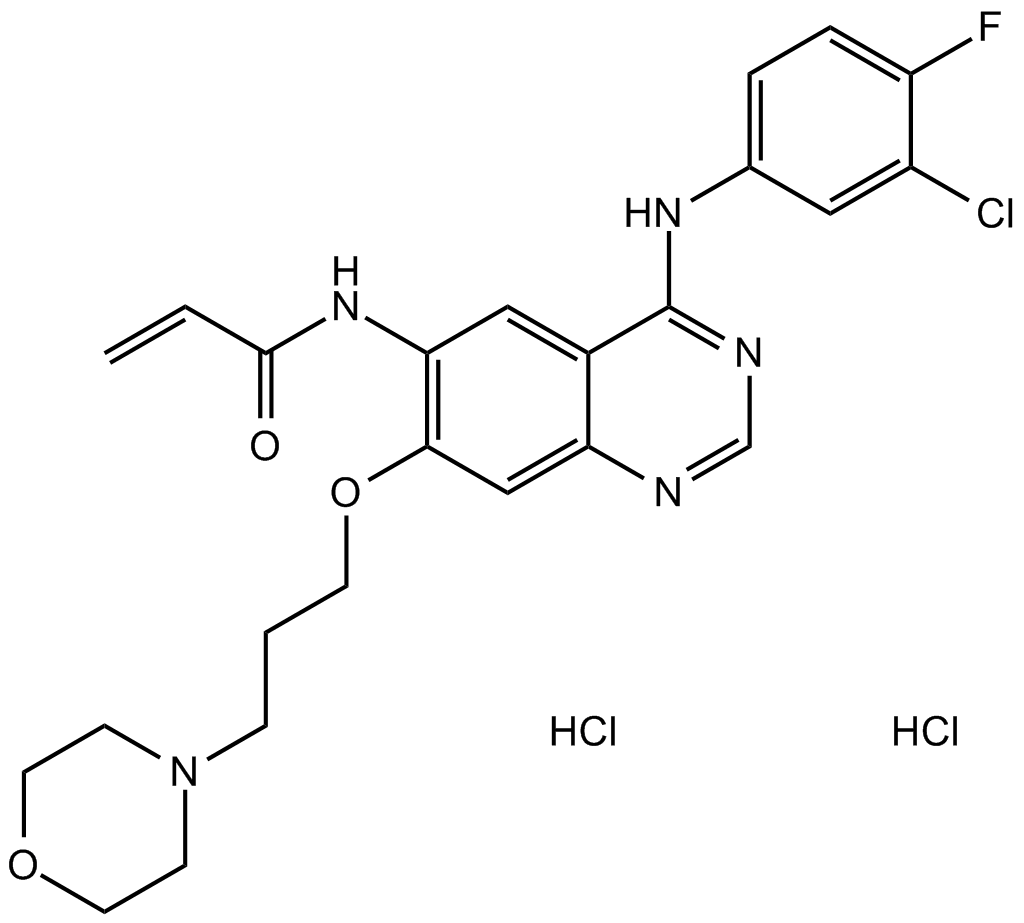Canertinib dihydrochloride (Synonyms: CI-1033, PD 183805) |
| Catalog No.GC12087 |
A pan-ErbB tyrosine kinase inhibitor
Products are for research use only. Not for human use. We do not sell to patients.

Cas No.: 289499-45-2
Sample solution is provided at 25 µL, 10mM.
Canertinib dihydrochloride is a selective inhibitor of Pan-erbB tyrosine kinase with IC50 value of 3.5 nM [1].
ErbB receptor family is a member of the receptor tyrosine kinase superfamily and plays an important role in the normal breast development. It has been shown that ErbB overexpression involves in the pathogenesis and progression of breast cancer and is a negative prognostic indicator for breast cancer [2].
Canertinib dihydrochloride is a potent ErbB inhibitor and has a different selectivity with the reported ErbB inhibitor erlotinib. When tested with BT474 cells overexpressing ErbB2-receptor, treatment with Canertinib dihydrochloride induced cell apoptosis with 47% fraction by inhibiting Akt and MAPK activity [3]. In a panel of neuroblastoma cell lines, treated with Canertinib dihydrochloride resulted in a significant reduction in cell yield with IC50 value ranging from 0.94 μM to 2.45 μM and induced cell apoptosis from 3% to 56% tested with SK-N-SH cells [2].
In 12 week old NOD-SCID-IL2R gamma knockout mouse model with SK-N-SH cells subcutaneous xenograft, administration of Canertinib dihydrochloride for 18 days resulted in a marked reduction in tumor growth and final tumor weight [2].
References:
[1].Smaill, J.B., et al., Tyrosine kinase inhibitors. 17. Irreversible inhibitors of the epidermal growth factor receptor: 4-(phenylamino)quinazoline- and 4-(phenylamino)pyrido[3,2-d]pyrimidine-6-acrylamides bearing additional solubilizing functions. J Med Chem, 2000. 43(7): p. 1380-97.
[2].Richards, K.N., et al., Signaling of ERBB receptor tyrosine kinases promotes neuroblastoma growth in vitro and in vivo. Cancer, 2010. 116(13): p. 3233-43.
[3].Nelson, J.M. and D.W. Fry, Akt, MAPK (Erk1/2), and p38 act in concert to promote apoptosis in response to ErbB receptor family inhibition. J Biol Chem, 2001. 276(18): p. 14842-7.
Average Rating: 5 (Based on Reviews and 30 reference(s) in Google Scholar.)
GLPBIO products are for RESEARCH USE ONLY. Please make sure your review or question is research based.
Required fields are marked with *




















